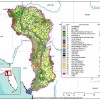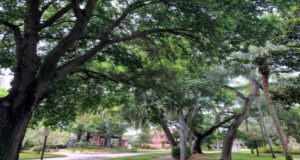This new 13-page article combines canopy coverage data from all of Florida’s metropolitan and micropolitan areas with ecological models developed by the USDA Forest Service to calculate several key benefits of urban trees and an approximation of their monetary value. Benefits of urban trees include carbon sequestration/storage, air pollution filtration, and stormwater mitigation. Written by Drew C. McLean, Andrew K. Koeser, Deborah R. Hilbert, Shawn Landry, Amr Abd-Elrahman, Katie Britt, Mary Lusk, Michael G. Andreu, and Robert J. Northrop, and published by the UF/IFAS Environmental Horticulture Department.
https://edis.ifas.ufl.edu/ep595
Tag: Amr Abd-Elrahman
Stewardship Ecosystem Services Study Series: Assessing Forest Water Yield and Purification Ecosystem Services in the Lower Suwannee River Watershed, Florida
 Land-use decisions and ecosystem characteristics affect the amounts of nutrients that end up in water bodies and the ability of the land to provide ecosystem services. Water quality is also highly valued by Florida forest landowners and managers. So, understanding the role of land use and forest cover and types, management practices, and conservation programs in reducing nutrient pollution will allow landowners, forest managers, and policy makers to make informed and better management decisions. In this 6-page fact sheet, we present the results of a study that used easily available models and information to assess the role of forests in providing ecosystem services, including water quality improvement or purification. Specifically, this assessment used available geospatial data and the InVEST Water Purification model to estimate how forest vegetation and soils purify water through the retention, and subsequent export, of nitrogen and phosphorus polluted runoff. Written by Sonia Delphin, Francisco J. Escobedo, Amr Abd-Elrahman, Alison E. Adams, Jackie Martin, Ronald Cademus, and published by the UF Department of School of Forest Resources and Conservation, January 2014.
Land-use decisions and ecosystem characteristics affect the amounts of nutrients that end up in water bodies and the ability of the land to provide ecosystem services. Water quality is also highly valued by Florida forest landowners and managers. So, understanding the role of land use and forest cover and types, management practices, and conservation programs in reducing nutrient pollution will allow landowners, forest managers, and policy makers to make informed and better management decisions. In this 6-page fact sheet, we present the results of a study that used easily available models and information to assess the role of forests in providing ecosystem services, including water quality improvement or purification. Specifically, this assessment used available geospatial data and the InVEST Water Purification model to estimate how forest vegetation and soils purify water through the retention, and subsequent export, of nitrogen and phosphorus polluted runoff. Written by Sonia Delphin, Francisco J. Escobedo, Amr Abd-Elrahman, Alison E. Adams, Jackie Martin, Ronald Cademus, and published by the UF Department of School of Forest Resources and Conservation, January 2014.
http://edis.ifas.ufl.edu/fr385
